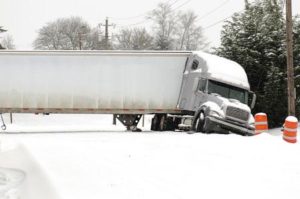
Jackknife Truck Accidents
The term jackknife truck accident describes several similar, but distinct, truck crash types. The name arises because the movement is similar to that of a pocket knife being folded.
A jackknifing semi truck is a dangerous and scary thing to be around. The truck has lost control, can crash into other vehicles on the road and has the potential to obstruct traffic on the road causing chain reaction crashes involving multiple vehicles, deaths and and injuries. According to Federal data in 2017 there were more than 5,000 jackknife truck accidents involving large trucks in the U.S.. representing about 4% of fatal truck crashes and 1% of injury truck crashes that year.
What is a Jackknife Accident?
A jackknife is a dangerous scenario where the trailer and the cab of a truck go in different directions, often forming a V-shaped angle with each other. The term originates from the appearance of a jackknife, a foldable pocket knife, when it folds into its handle.
A jackknife accident can happen without any warning and can be very catastrophic. A commercial truck can weigh 80,000 pounds or more. It isn’t hard to understand what can happen when it collides with another vehicle—or worse, a person.
What Causes a Truck to Jackknife?
A jackknifed big rig accident typically arises from loss of traction which causes the driver to lose control of the truck. Roads which are slick from ice, snow or rain are prime conditions for a jackknife truck accident. Driving too fast for the road conditions and improper braking are also common causes. A federal study found that bad weather conditions increase the likelihood of a jackknife threefold. The vast majority of jackknifes- 95% by one estimate involve lightly loaded trailers carrying 15,000 pounds or less. Traveling on a curve, and particularly oversteering or understeering in a curve, are other risk factors with the same federal study finding traveling on a curve almost doubles the risk of a jackknife.
Jackknifing can happen when the brake is suddenly applied to a tractor-trailer. A 18 wheeler’s brake system is more complex than that of cars; it consists of three braking options: the steering axle brakes, the drive axle brakes, and the trailer brakes. A true jackknife accident can occur when the driver abruptly tries to stop using the drive axle brake – it locks the drive wheels but not the ones on the trailer, causing a skid.
There are various reasons a truck driver suddenly or improperly applies a brake. It could be to avoid hitting someone or something. Or, the truck may have a mechanical issue that causes its brake system to malfunction. Going at high speed also increases the risk of the truck jackknifing when braking.

What Happens When a Truck Jackknifes?
A jackknifing truck can swing or spin across traffic lanes, hit other vehicles and obstruct traffic on the road. Other vehicles on the road can crash into the jackknifed semi and chain reaction highway pile-ups have resulted.
Jackknife accidents may involve multiple vehicles or pedestrians. They can cause fatalities and injuries ranging from mild concussions and bruises to traumatic brain injury and nerve or muscle damage. Anyone injured in a jackknife accident should consider seeking medical attention immediately.
People involved in a jackknife accident may consider or in some cases should:
- Request for medical help for injured people immediately.
- Contact law enforcement.
- If safe document details of the accident. Take photos of all vehicles involved, especially the truck and trailer. Check if the truck contains the logos, name or USDOT# of the company or operator and photograph these
The Danger of a Jackknife Truck Accident
Each type of jackknife truck accident presents the potential for obstructing traffic in one or more lanes on the road increasing the risk of other vehicles on the road crashing into it. This is particularly dangerous on high speed multiple lane highways and can cause a multi-vehicle pile-ups or chain reaction collisions, multiple injuries and, in some cases fatalities. Whatever the case, a jackknife crash has the potential to cause serious injuries – and even fatal ones – to multiple people.
 In a typical true truck jackknife accident, the tractor of the semi-truck spins around and crashes into the trailer it is pulling. True jackknifes happen suddenly, with little opportunity for the truck driver to stop the truck jackknifing once it has started. In “plow out” the truck can’t be steered and “plows out” in the direction it is traveling.
In a typical true truck jackknife accident, the tractor of the semi-truck spins around and crashes into the trailer it is pulling. True jackknifes happen suddenly, with little opportunity for the truck driver to stop the truck jackknifing once it has started. In “plow out” the truck can’t be steered and “plows out” in the direction it is traveling.
In a “trailer swing” also called a “swing out” the trailer of the big rig accident swings out across the road and can end up at a 90-degree angle with the truck’s tractor. Trailer swings can start more slowly with the possibility for a skilled truck driver to recover control. Each of these types of jackknife accidents involve the potential of other vehicles on the road being hit by the out-of-control jackknifing truck.
Trailer swings can also be less extreme but equally dangerous. They can cause the back of the trailer to suddenly enter one or more adjacent traffic lanes with the potential of a catastrophic crash when the rear of the trailer without warning crashes into or appears immediately in front of another vehicle with no opportunity to avoid a crash.
Preventing Jackknife Truck Accidents
There are a number of very basic steps truck drivers can take to avoid a jackknife truck accident. It starts with the truck’s load. The truck driver and trucking company need to ensure that the load is properly distributed on the truck so that the truck is balanced and stable. Slow, smooth deceleration can help prevent a jackknife accident. Truck drivers need to brake smoothly and do so before turns and try to avoid braking during them.
Slick conditions like those from rain, snow or ice present particular challenges. Truckers are advised to check their mirrors to watch for the trailer begging to swing out. If they see this it is recommended that they release the brakes and straighten the semi before attempting to brake again. Truck drivers need to react quickly if the trailer starts to swing out because after a certain point they may not be able to stop the trailer from swinging further.
Technology like anti-lock brake systems (ABS) and electronic stability control (ECS) can be effective in preventing jackknifes. ABS is required on new trucks and as more and more old trucks are taken out of service and replaced by new ABS equipped tractors it is expected that jackknifes will become less prevalent. However, trucking companies must be careful to match brake systems on tractors and trailer. A mismatch in braking equipment where the tractor is equipped with anti-lock brakes (ABS) and the other trailer is not or the trailer has ABS and the tractor does not can also increase the risk of a jackknife truck accident due to the differences in how ABS and non-ABS brakes operate.
Considerations If You’re Injured in Jackknife Accident
As seen from the tragic Kansas City area multi-vehicle crash example, described above, jackknifes in cause serious injuries like head trauma, neck or spine injury, severe fractures, catastrophic injuries and, in some cases death.
A jackknifing accident case may be complicated. If you or someone in your family has been injured in a jackknife crash in Missouri or Kansas, your best course of action is to hire a trucking accident attorney with skills and experience to win such a case. Flick Law Firm has years of experience working truck accident cases, and has been repeatedly successful in obtaining fair compensation for clients. Contact Flick Law Firm today for the legal help you need.










